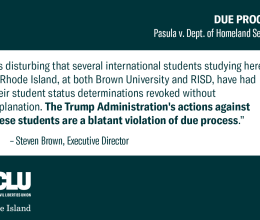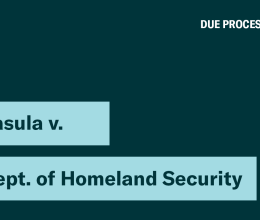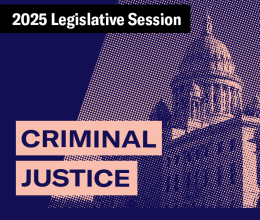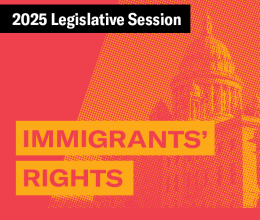(From Left to Right: ACLU of RI cooperating attorney John E. MacDonald, executive director of RICH Jim Ryczek, executive director of OpenDoors Sol Rodriguez, executive director of House of Hope CDC Jean M. Johnson discuss the law on the morning of the lawsuit's filing.)
The American Civil Liberties Union of Rhode Island today filed a class action lawsuit to challenge the constitutionality of a recently enacted law that makes it a crime for certain sex offenders to reside within 1,000 feet of a school. As part of the suit, the ACLU has requested a restraining order to halt the law’s “inconsistent" and “arbitrary” implementation before any more individuals are uprooted or made homeless.
Today’s suit, filed in U.S. District Courtby ACLU of RI cooperating attorneys Lynette Labinger and John E. MacDonald, argues that the residency prohibition placed on all Level 3 sex offenders is unconstitutionally vague, violates due process, retroactively punishes those who have already completed their sentences, and interferes with “liberty and privacy interests while bearing no rational relationship to a legitimate purpose.”
Both nationally and locally, correctional administrators, experts involved in the treatment of sex offenders, victims’ rights groups, and advocates for the homeless have opposed sex offender residency laws as being ineffective, counter-productive, and potentially more, rather than less, harmful to public safety.
One of the six named plaintiffs was given just 36 hours to move, and has been staying at various motels since then. Three of the plaintiffs who live in Providence have been given until Monday to move or else face felony penalties, but they have been unable to secure new housing. One plaintiff found three potential apartments to rent, but each fell within 1,000 feet of a school. Most of the individuals will be soon be forced to move into Harrington Hall in Cranston, the only homeless shelter in the state accepting sex offenders that is not within 1,000 feet of a school.
The lawsuit argues that the law is unconstitutionally vague and violates due process because it fails to define a school, does not establish a clear methodology for measuring 1,000 feet, and does not provide any exemptions or appeals process for those affected. In emphasizing the irrationality of the law, the suit notes that it applies to all Level 3 sex offenders, even if their crime was committed against an adult and even though the overwhelming majority of sex offenses are committed against people the offender knows, not strangers.
Advocates from the Rhode Island Coalition for the Homeless (RICH), OpenDoors, and House of Hope CDC joined the ACLU in announcing the filing of the suit. The organizations noted that by pushing individuals out of their homes and limiting where they can live, the law encourages homelessness. The effect is to make it more difficult for law enforcement to monitor them and for offenders to reintegrate themselves into the community. By disrupting vital rehabilitative services, the groups argued, the law increases, rather than decreases, risks to public safety.
The filing of the lawsuit today comes just days before dozens of Providence residents have been ordered to move. The suit has been filed as a class action so that any rulings made in this case would apply to all individuals who are or could be affected by this law.
Attorney MacDonald said today: “We believe that this law is unconstitutional on its face and deeply flawed from a public safety standpoint. Numerous empirical studies have consistently shown that these residency restrictions do not prevent crimes but simply increase homelessness and lesson public safety.“
Jim Ryczek, executive director of RICH, added: “This new law not only imposes a stronger barrier to overcome to help homeless shelter residents obtain housing, but threatens to increase the number of shelter residents by eliminating the stable housing they have and causing them to enter an already overcrowded homeless shelter system.”
Jean M. Johnson, executive director of House of Hope CDC, noted: "Despite the fact that the onset of winter weather is not yet upon us, House of Hope is already experiencing significant overcrowding at Harrington Hall. We are in the business of alleviating homelessness. Creating a situation that forces more people into homelessness without providing any alternative for shelter and services is intolerable.”
Sol Rodriguez, executive director of OpenDoors, said: “People affected are being forced out of their apartments; some are homeowners, have families, are sick, disabled, and some live in nursing homes. Some are family caretakers. They have served the sentence imposed for their crimes and are known to law enforcement due to sex offender registry laws. This law will further destabilize this population.”
The law was approved by the Rhode Island General Assembly in June and signed into law by Governor Gina Raimondo despite opposition from the ACLU and community advocates. Level 3 sex offenders were previously prohibited from living within 300 feet of a school. The ACLU will be asking the federal court to grant a temporary restraining order to stop the enforcement of this statute while this complaint is being litigated.





